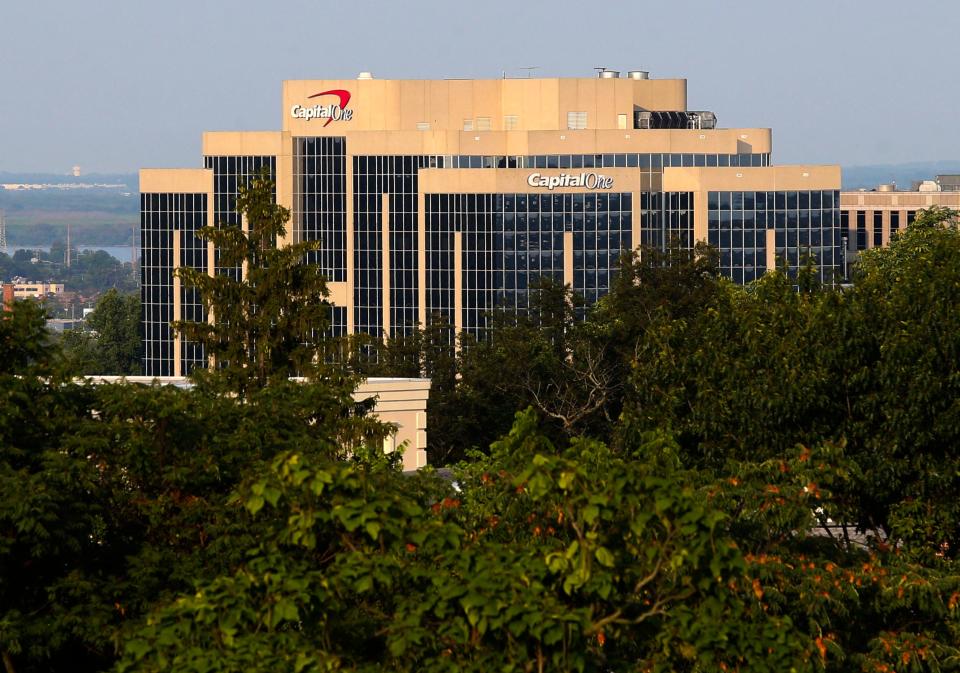Capital One is buying Discover in a blockbuster $35B deal. What's this mean for Delaware?
The financial holding company Capital One Financial Corp. filed paperwork in March with the Federal Reserve and Delaware's bank commissioner to acquire credit card and online banking company Discover Financial.
The $35 billion deal could potentially put Capital One on a footing to compete with the longstanding credit card duopoly of Visa and Mastercard, many commentators believe. It would also mark one of the biggest banking deals of the past 15 years.
But this isn't just a global deal. It's a local one, too. Though neither company is headquartered in Delaware, both are incorporated in the First State. And with more than 2,000 Delaware employees between the two companies, the state will play an outsized role in the merger of the two financial giants.
How would this affect Delaware? And what would the acquisition mean? Here's what we know.
What does it mean if Capital One acquires Discover?

If Capital One's acquisition of Discover goes through, the deal could massively shake up the credit card industry, experts say.
As of the end of 2021, around half of credit card payments were made on Visa cards, according to federal figures. Another quarter to a third were made with Mastercard. Discover credit cards are ranked a distant fourth place, behind American Express.
Capital One, a bank holding company with $480 billion in assets and $37 billion in revenues as of the fourth quarter of 2023, is one of the largest issuers of Visa and Mastercard credit cards.
Acquiring Discover would just make Capital One the sixth largest bank in America, according to an analysis from Northwestern University finance professor Lulu Wang. (Capitol One's figures say it would be in eighth place.) The merger would also potentially allow Capitol One to break up Visa's dominance by transitioning some of its current Visa and Mastercard customers to the Discover network, according to this analysis, leading to a "realignment" of the credit card industry and greater competition.
Capital One executives have said much the same. The combined company would be "in a stronger position to compete against the nation’s largest banks and payment networks," said Capital One's CEO Richard D. Fairbank in the company's annual report to shareholders.
He told shareholders on Feb. 20 that the company plans to move a "growing portion of the credit card business to the Discover network," totaling as many as 25 million Capital One cardholders by 2027.
How would Delaware be affected by a Capital One acquisition of Discover?

Capitol One is based in Virginia, and Discover is based in Illinois. But both companies are incorporated in Delaware. Like many banking companies, both companies have a sizable presence in the Small Wonder. Both were named among the top large workplaces in the state last year.
More: Capital One's diversity, flexibility leads it to No. 2 for large companies in Top Workplaces
"Delaware will play an outsized role in the acquisition, as home to roughly 2,000 Capital One and Discover associates and the home of Discover's only bank branch in Greenwood," wrote Capital One spokeswoman Sarah Craighill, who noted that each of the companies employed more than 1,000 people in the state.
As recently as 2021, Discover touted 1,100 employees working in fraud, customer care and consumer banking at its Iron Hill Corporate Center.
After acquiring Delaware-based ING Direct bank for $9 billion in 2011, Capital One has occupied the 14-story office building at 802 Delaware Ave., as well as space in the neighboring building at 800 Delaware Ave. In news reports from 2019 and 2021, Capital One reported 2,000 employees in Delaware.
More: Capital One's renovation hints at keeping its 2,000 Delaware employees in Wilmington
The company has not yet released plans regarding Delaware employees or offices, though Capital One executives plan to embark on "listening tours" across the state this year.
"In the coming months, Capital One leaders will be meeting with members of the community across Delaware to share more about how this deal will help consumers and the economy," wrote Capital One's Delaware market president, Joe Westcott, in a March 20 op-ed in Delaware Online/The News Journal.
Westcott emphasized that the deal would be good for Delaware's clout in the financial universe, allowing the state to "punch above its weight."
Op-ed: With Capital One-Discover deal, Delaware can punch above its weight
Would the Capital One-Discover deal be good for credit card customers?
Certainly, that's the argument Capital One is making to federal regulators.
In their federal application, Capital One argued that the deal would increase competition among credit card networks, and give consumers new banking options without significantly hurting competition in other financial arenas.
The deal would "deconcentrate and improve competition" in a debit and credit network industry long dominated by Visa and Mastercard, Capital One argued — arenas that "sorely need an injection of competitive rivalry." Vertical integration would also allow Capital One to charge lower fees.
But it's complicated. Northwestern University professor Wang hypothesized that increased competition might lead Visa and Mastercard to compete by offering higher interchange fees to banks that issue credit cards, thus keeping these banks as issuers.
While higher competition would be terrific for the banks, according to Wang's analysis, the situation might not be as rosy for Main Street merchants. Higher fees paid to banks might cause higher fees for the merchant at the checkout counter, Wang reasoned.
It's also not hard to imagine these fees getting passed on to customers using credit cards, already a common practice at some restaurants and retailers.
More: Americans relying less on cash, more on credit cards may pay more fees. Here's why.
On the flip side, analysts say, cardholders may benefit because credit card companies may compete more vigorously for cardholders by offering better rewards and benefits.
The deal may help Capital One "expand access to industry-leading no fee and no minimum bank accounts, reduce fraud and deliver new benefits for consumers and businesses," wrote Capital One's Westcott in his March 20 editorial.
When would any potential deal between Capital One and Discover go through?
Deals of this size involve oversight by both federal and state regulatory bodies, and are subject to shareholder approval.
In a February press release, Capital One said it hopes to close the transaction "in late 2024 or early 2025, subject to satisfaction of customary closing conditions."
Matthew Korfhage is business and development reporter in the Delaware region covering all things related to land and money: openings and closings, construction, and the many corporations that call the First State home. Send tips and insults to mkorfhage@gannett.com.
This article originally appeared on Delaware News Journal: The Capital One/Discover merger might change banking, and Delaware
